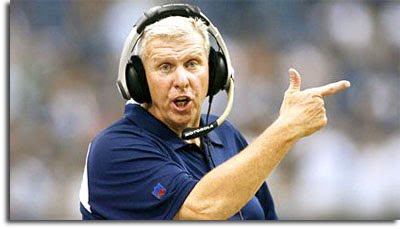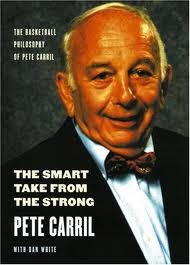 Brick walls are there for a reason. The brick walls are not there to keep us out. The brick walls are there to give us a chance to show how badly we want something. Because the brick walls are there to stop the pople who don't want it bad enough. --Randy Pausch--Last Lecture
Brick walls are there for a reason. The brick walls are not there to keep us out. The brick walls are there to give us a chance to show how badly we want something. Because the brick walls are there to stop the pople who don't want it bad enough. --Randy Pausch--Last Lecture Thursday, March 31, 2011
Purpose of Brick Walls--Randy Pausch
 Brick walls are there for a reason. The brick walls are not there to keep us out. The brick walls are there to give us a chance to show how badly we want something. Because the brick walls are there to stop the pople who don't want it bad enough. --Randy Pausch--Last Lecture
Brick walls are there for a reason. The brick walls are not there to keep us out. The brick walls are there to give us a chance to show how badly we want something. Because the brick walls are there to stop the pople who don't want it bad enough. --Randy Pausch--Last Lecture Brad Stevens On TEAM
Wednesday, March 30, 2011
Delivering Your Message
Tuesday, March 29, 2011
Honesty, Brutal Honesty--Parcells Fundamental Lesson Of Leadership
 Fundamental Element of Leadership—Honesty, Brutal Honesty You have to be honest with people—brutally honest. You have to tell them the truth about their performance, you have to tell it to them face-to-face and you have to tell it to them over and over again. Sometimes the truth will be painful, and sometimes saying it will lead to an uncomfortable confrontation. So be it. The only way to change people is to tell them in the clearest possible terms what they’re doing wrong. And if they don’t want to listen, they don’t belong on the team. --Bill Parcells
Fundamental Element of Leadership—Honesty, Brutal Honesty You have to be honest with people—brutally honest. You have to tell them the truth about their performance, you have to tell it to them face-to-face and you have to tell it to them over and over again. Sometimes the truth will be painful, and sometimes saying it will lead to an uncomfortable confrontation. So be it. The only way to change people is to tell them in the clearest possible terms what they’re doing wrong. And if they don’t want to listen, they don’t belong on the team. --Bill Parcells
Monday, March 28, 2011
A Leagure of Their Own--What Makes Us Great
Brian Tracy's 5 Ways To Develop A Sense of Urgency

5 Ways to Develop A Sense of Urgency
Perhaps the most outwardly identifiable quality of a high performing man or woman is "action orientation."
1. Take Time to Think and Plan Highly productive people take the time to think, plan and set priorities. They then launch quickly and strongly toward their goals and objectives. They work steadily, smoothly and continuously and seem to go through enormous amounts of work in the same time period that the average person spends socializing, wasting time and working on low value activities.
2. Getting into "Flow" When you work on high value tasks at a high and continuous level of activity, you can actually enter into an amazing mental state called "flow." Almost everyone has experienced this at some time. Really successful people are those who get themselves into this state far more often than the average. In the state of "flow," which is the highest human state of performance and productivity, something almost miraculous happens to your mind and emotions. You feel elated and clear. Everything you do seems effortless and accurate. You feel happy and energetic. You experience a tremendous sense of calm and personal effectiveness.
3. Become More Alert and Aware In the state of "flow," identified and talked about over the centuries, you actually function on a higher plane of clarity, creativity and competence. You are more sensitive and aware. Your insight and intuition functions with incredible precision. You see the interconnectedness of people and circumstances around you. You often come up with brilliant ideas and insights that enable you to move ahead even more rapidly.
4. Develop a Sense of Urgency One of the ways you can trigger this state of flow is by developing a "sense of urgency." This is an inner drive and desire to get on with the job quickly and get it done fast. This inner drive is an impatience that motivates you to get going and to keep going. A sense of urgency feels very much like racing against yourself.
5. Create a "Bias for Action" With this ingrained sense of urgency, you develop a "bias for action." You take action rather than talking continually about what you are going to do. You focus on specific steps you can take immediately. By employing this technique you concentrate on the things you can do right now to get the results you want and achieve the goals you desire.
Action Exercises Here are two things you can do immediately to put these ideas into action: First, select one major task confronting you and launch into it immediately. Don't hesitate. Move fast.
Second, start doing this every morning, first thing, until it becomes a habit.
Sunday, March 27, 2011
Process Oriented Thinking

Focusing on the Process allows you to remain focused on "What Creates Success". Make sure your Process Focuses: 1. On Taking Responsibility 2. On Controlling What We Can Control 3. On Staying On Purpose 4. Away From Acting On Feelings
Friday, March 25, 2011
Vital Skill Sets--Recommended Reading
 Just as we develop the skills of the players on our teams. Individual skill development isn't limited to the court or playing field. Skill development is necessary for leaders. The following is a reading list sorted by topic/ skill:
Just as we develop the skills of the players on our teams. Individual skill development isn't limited to the court or playing field. Skill development is necessary for leaders. The following is a reading list sorted by topic/ skill:PROFESSIONAL DEVELOPMENT & GOAL SETTING
As A Man Thinketh--James Allen
Change Your Thinking, Change Your Life--Brian Tracy
Eat That Frog--Brian Tracy
First Things First--Stephen Covey
Five Major Pieces To The Life Puzzle--Jim Rohn
Focal Point--Brian Tracy
Goals--Brian Tracy
Learning Journeys--Marshall Goldsmith
Million Dollar Habits--Brian Tracy
Outliers--Malcolm Gladwell
Power of Focus--Jack Canfield
The Power of Who--Bob Beaudine
Seven Strategies For Wealth & Happiness--Jim Rohn
Think & Grow Rich--Napoleon Hill
COMMUNICATIONS & RAPPORT
Blink--Malcolm Gladwell
Definitive Book of Body Language--Alan & Barbar Pease
The Fred Factor--Mark Sanborn
How To Win Friends & Influence People--Dale Carnegie
In The Line of Fire--Jerry Weissman
Seven Habits of Highly Effective People--Stephen Covey
PROFESSIONAL MEETING SKILLS
Death By Meeting--Patrick Lencioni
How To Run A Successful Meeting--Milo Frank
Managing Meetings--Tim Hurdle
We've Got To Start Meeting Like This--Mosvick & Nelson
LEADERSHIP
Developing Leaders--Harvard Press
The 80/20 Principle--Richard Koch
The Effective Executive--Peter Drucker
Leadership--Rudolph Giuliani
Leadership 101--John Maxwell
On Becoming A Leader--Warren Benis
The Servant--James Hunter
The Speed of Trust--Stephen Covey
Winning--Jack Welch
MANAGEMENT
Crazy Busy--Edward Hallowell MD
Fish--Stephen Lundin
Flipping The Switch--John Miller
Getting Things Done--David Allen
Good To Great--Jim Collins
QBQ--John Miller
Predictably Irrational--Dan Ariely
Ready For Anything--David Allen
Who Moved My Cheese--Spencer Johnson MD
STRATEGIC PLANNING
The Art of War--Sun Tzu
Band of Brothers--Stephen Ambrose
Built To Last--Jim Collins
On War--Carl Von Clausewitz
Wisdom of Generals--William Cohen
Thursday, March 24, 2011
Overcoached & Undertaught--Pete Carril Distinguishes Between Coaching & Teaching

Difference Between Coaching & Teaching
“There is a difference between teaching and coaching. When you are instructing your team about the actual game, you are teaching them, transmitting knowledge and information to them. There are guys who don’t teach their players anything or much of anything, but who go around and recruit the best players and win—they’re coaches but not teachers.”
--Pete Carril
Wednesday, March 23, 2011
The Two Important Things In Learning
Tuesday, March 22, 2011
Silence Your Inner Critic--Performance Equation

3 Defensive Essentials

1. Eliminate Easy Baskets As Much As Possible--to do this we mist do the following things every game:
a. Control the fastbreak. Have great transition defense.
b. Control individual breakdowns. Prevent scores created by dribble and cutter penetration.
c. Control the second shot baskets. Attack the rebound and loose ball.
d. Control the open shots. Rotate to cover/ prevent open men.
e. Force the opponent to make an extra pass or play.
2. Essential Component of the Defensive Mindset Is To:
a. Control the immediate threat, to do this requires knowledge of how to defend all the basic 2 & 3 man offensive exercises.
3. Other Essentials:
a. Talk on defense. Never been a great silent defense.
b. Help on defense. Willing to give yourself up for teammates.
c. Attack all penetration.
d. Have the courage to be physical. Put bodies on people. Make the first hit on blockouts and challenge cutters.
Monday, March 21, 2011
Jim Collins 10 Keys To Success

1. Build a pocket of greatness
2. Do your diagnostics--self assess
3. Right people in the key seats of the bus
4. Build a personal board of directors
5. Create pockets of quietness to think
6. Ask more questions in relation to making statements
7. Disciplined action (have a stop doing list)
8. Experiment with removing titles
9. Articulate core values
10. How to be useful
Thursday, March 17, 2011
NCAA Preparation--Playing The Percentages
Wednesday, March 16, 2011
3 Musts For Our NCAA Preparation

2011 NCAA Tournament Preparation
3 Musts For Us To Continue Our Success:
1. We Must Be SOUND
a. Great fundamentals
b. Servant leadership mentality
c. Clear minds/ Set on our Vision/ Limit Mental Clutter
2. We Must Be SOLID
a. In our TEAM Attitude
b. In our Work Ethic
c. In Sustaining Effort
3. We Must Be SIMPLE
a. Do what we do…Nothing to prove.
b. It’s all about what we do…Can only control our Attitude & Effort
c. The more we think, the slower our feet will be.
d. Respect our opponents, but fear none of them.
e. Limit distractions.
Tuesday, March 8, 2011
Most Important Thing Gene Bess Learned In Coaching
Friday, March 4, 2011
"The Steeler Way"--Chuck Noll On Creating A Culture

Thursday, March 3, 2011
John Maxwell's Formula For Planning

Formula For Planning
1. Predetermine A Course of Action--just as we use roadsigns and markers--VISION
2. Lay Out Your Goals--
3. Adjust Your Priorities--well defined goals quickly expose activities that are hindering progress toward certain objectives
4. Head Into Action--don't wait, get going
5. Expect Problems--no plan eliminates all problems, expect adversity.
6. Daily Review Your Planning--quick review helps us plan ahead.
Wednesday, March 2, 2011
CHOICES

Choices
We are accountable for our own choices and are free to make better ones is fundamental to our growth.
Sometimes people think they have no choice. They’ll say things like “I have to” or “I can’t”. But we always have a choice. Always. Even deciding not to choose is making a choice.
Realizing this and taking responsibility for our choices is a big step toward making great things happen in our lives.
--From QBQ! The Question Behind The Question





